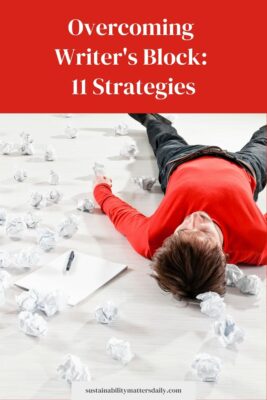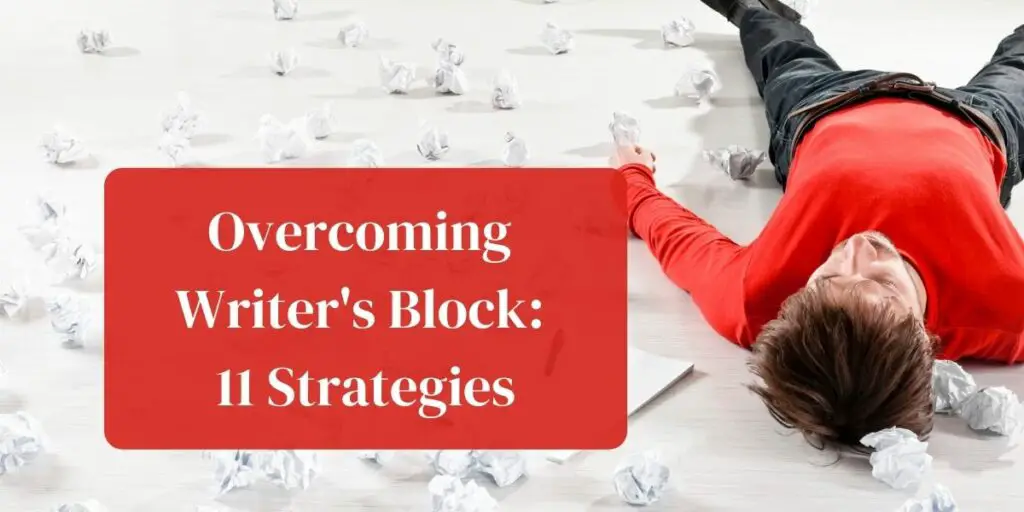I’ve been writing more or less regularly for over 15 years; currently at least 4 days a week. How many writer’s blocks – big and small – have I had in that time?
I don’t know. Many.
Today they occur only rarely and faintly. Over time, I’ve developed my strategies against them. I’m sharing them with you today.
In this article, I’ll explain in detail how you can solve and overcome your writer’s block – and how you can prevent it from happening in the first place.

What is writer’s block?
You’re sitting in front of a white sheet of paper, pen in hand or with the blinking cursor in front of your eyes, and you want to get started: but you just can’t think of a clear word. Your brain seems to be blocked.
Or you’ve already written something, erasing, correcting, and rewriting every sentence ten times, and you’re not satisfied with anything.
Or you haven’t even gotten that far. Just thinking about writing something today makes you nervous. That’s why you prefer to distract yourself, check your emails and your social media apps, or suddenly discover that your desk needs a good cleaning.
You keep putting off writing: ‘After all, tomorrow is another day.’
Your writer’s block can come in all of these forms. For me, it’s mainly the third variant of the procrastination type.
What causes writer’s block?
If you know where your writer’s block comes from, you can develop better strategies against it. I distinguish between three possible causes:
“I can’t write”.
This cause often applies to people who write infrequently and who have their writing experience primarily from school or college. At that time, you learned: ‘Express yourself as complicatedly and professionally as possible and don’t make any mistakes!’ Your teachers may have regularly criticized your essays.
Then you came to the conclusion that you probably can’t write well and should limit yourself to texting and writing shopping lists in the future. ‘Writing? That’s for authors and linguists.’
If you think this way, and now you have to write a longer text, this opinion about yourself can block you. Everything in your body resists having to relive those unpleasant experiences.
“Where do I start?”
If you have to write about unfamiliar topics or very long texts, your writer’s block can come from this direction. The thought of having to write ten or even three full pages makes you anxious: how are you going to do it?
Maybe you’ve already researched and figured out everything behind a topic. You’ve found masses of material and have no idea how to turn it into a compact and easy-to-understand text. You’re literally faced with a seemingly insurmountable mountain of information.
“I’m totally stressed out”
To write, you need a certain calmness and clarity in your mind. Every so often you lack it because certain problems plague you and put you under pressure: maybe you have health, financial or family problems. You simply don’t have the strength to sit down for a while and concentrate on writing. Your thoughts circle around other things.
In such a situation, tips against writer’s block are probably of less use to you. Try to change something about your situation first, so that you become calmer again. (Easier said than done, I know.)
If writer’s block hits you for the other two reasons described above, try the strategies I’m about to describe.
Strategy 1: Write regularly
Sounds simple, but in my view it’s the ultimate strategy for success: write regularly and as often as possible. Writing is like any other task: the more frequently you do something, the easier and more natural it becomes.
Although I write 2-4 longer (and many shorter) texts in a normal week, I still get mini writer’s block every now and then. When?
Whenever my schedule keeps me from writing for several days or maybe even weeks: due to vacations, weekends, illness, or major consulting projects for clients.
After that, I find it crazy hard to get going again; every day I put off writing a text, the hurdle gets bigger.
Moreover, the same thing can happen if I have to write text in an unfamiliar format or for an unfamiliar topic. Then I’m relatively certain to put it off for a few days. (Fortunately, I have enough assignments that I can bring forward, so I don’t have to fritter away my time).
So writing regularly is a must, even for me, as an old hand; no one is completely immune to writer’s block.
But what if writing is not your profession or your main job, but you still need to write longer texts occasionally? Even then, there’s no way around the fact that you need to develop a certain habit.
If writing is your “fear adversary,” there are no easy tricks to defeat it. No difficult task can be mastered without some routine.
Strategy 2: Set realistic goals
Writing regularly doesn’t have to mean producing a blog article every day or writing half the day. Instead, set realistic goals.
If you’re a couch potato who suddenly wants to exercise, you also (hopefully) don’t start with one-hour-and-a-half power workouts. Instead, you might run a 15-minute lap every day for the time being.
Do the same with your writing: Make it a point on your to-do list to write something for 15 minutes every morning before you start work. Or even just 5 minutes. The main thing is that you actually write during this time.
Don’t think about it, don’t seek for suitable expressions: write.
Of course, you have to prepare yourself and come up with a project. What you write doesn’t matter. It can be your journal, a social media post, or whatever comes to mind.
Instead of a set time, you can set a scope, like a quarter or half page. Over time, you can gradually set your goal higher.
Let’s be clear: the “quality” of what you write counts for nothing. This exercise is only meant to help you develop a habit and thereby avoid major writer’s block from the start.
Strategy 3: Get started
If you have set yourself a goal and want to write a text – no matter how long – only one thing counts now:
Start! Begin!
Sit down at the scheduled time, put your cell phone far away and anything else that might distract you. Now go ahead and write.
You need to know: There are no methods that will make writer’s block go away – except writing itself, or in other words, working on a text.
You can make it easier on yourself, but you ultimately have to get over yourself and start. Only then can your writer’s block slowly dissipate.
As always, the first few minutes are the worst. You’ll see, after 15 minutes, it goes much more smoothly. And suddenly you’re in the flow and keep going, even though you only wanted to write for 15 minutes…
Strategy 4: Have fun while writing
Have fun! ‘Haha, that was a good one. Great tip to overcome writer’s block. NOT.’
Yes, it is. What I mean is, sometimes the problem isn’t the writing itself. It’s that you have to write.
If you’re blocked to write about a certain topic, write something you enjoy first. For me, it’s blog articles like this one or LinkedIn posts. That’s where I don’t have to think so much, I just put my experiences down on paper.
For you it might be the diary I mentioned earlier, it could also be short stories or poems. Or write a letter to your best friend.
With texts that you enjoy, you can warm up and loosen up the writer’s block before you tackle the difficult task.
Strategy 5: Take it one step at a time
In addition to writing regularly, this strategy is a real game changer. Realize that most of the time, you don’t have to write at all to start writing.
Why not? Writing, that is, formulating thoughts on paper, is only the third of four steps to creating a text.
Let’s assume that you have already thought about a topic and an audience for the text. What then is the following process?
- You do research
- You create an outline
- You write
- You edit
So, you have two important tasks ahead of you before you even have to write a complete sentence in your own words.
Research: that sounds doable, right? After all, you suffer from writer’s block, not researcher’s block!
So start doing it, it’s easier and makes a lot more sense.
A word of caution: if you spend days researching and tweaking your concept, just so you don’t have to start writing… go back to Strategy 3.
Strategy 6: Create an outline
Creating an outline is the best way to avoid the “white sheet effect” and solve the “where do I start?” block.
After researching, you know a lot about a topic. You may still lack an overview and have a lot of information floating around in your head in an unorganized way.
Start by writing down individual aspects as keywords. Put everything on the page that seems important to you. Once you have them in front of you, you can organize them into main points and sub-points and put them in a logical order.
Take enough time to do this. This step is the most important in the whole writing process and may take hours, depending on how long your text will be.
Do not pay attention to the wording. Just write down the points as you think of them. Concentrate on the content. You can also copy passages from other texts that you have researched into the outline.
If you do this conscientiously and look at your paper after a while, you will realize one thing: You’ve practically built the article in its entirety without writing a single line correctly.
And you’ll also realize that the topic may not be as complicated as you initially thought; now that you see everything in front of you.
Up to this point, you’ve successfully tricked your writer’s block; and yet, you’re already warmed up and familiar with the topic, so writing will be much easier for you now.
And now, start fleshing out the thoughts in your outline.
Strategy 7: Forget about grammar and spelling
If you have trouble with spelling and grammar, or even elegant phrasing: never mind. First, write the way you know how.
No one is looking over your shoulder and giving you bad marks if you make mistakes.
You can still correct and improve your text later. You can also use tools for this, like LanguageTool Plus or Grammarly. You can also ask or hire others to proofread your text.
Your job is to explain the topic well and convey something to the reader. Don’t let bad school dictation experiences stop you.
Strategy 8: Start in the middle
You don’t necessarily have to start at the beginning of your text. Many people find it particularly difficult to start. Instead, you can simply start with another section of your text that you particularly like or know the most about.
At this point you realize again how advantageous a good outline is: You can pick out individual sections and write them separately. Nevertheless, everything fits together in the end.
If you are afraid of long texts, you can overcome your writer’s block by a little mind trick: See each subtopic as a text on its own. Instead of one long text, you’ll have several shorter ones.
If you get stuck at one point in the text and can’t think of anything good to say about it, don’t dwell on it too long. Jump to another place. When you’re mostly done with the text, you can take care of the remaining gaps.
Strategy 9: Consider the text to be a conversation
Research and outline done, and still, your brain is twisted, and the words don’t want to come out? Then I help myself with another trick.
I imagine explaining the topic to a friend who is not familiar with it.
I would first have to give them an introduction and a little overview, and then explain the individual points one by one. I imagine at what points they would ask what questions, and answer them.
When you’re talking to someone, it’s usually easier for you to articulate something than if you have to write it down. Say the words out loud to your imaginary friend and write them down in the same way.
This may sound awkward and very colloquial at first; but the thoughts are on the page. Later, you can revise them.
Strategy 10: Create your ideal environment
Where can you focus best? While there’s no miraculous place where your writer’s block will vanish into thin air, you can make it easier by creating the appropriate environment.
Some people appreciate their quiet office, others need people around them and like to work in a café or co-working space. A few background noises are often conducive to concentration: such as birds chirping, the sound of the wind or muffled voices.
If your environment isn’t ideal, put on headphones and have a focus app play such sounds for you.
Do some yoga, go for a short walk, drink enough, so you’re physically relaxed.
If you’re easily distracted, create a distraction-free environment. Leave your smartphone in another room and close all computer programs that you don’t need for work.
Also interesting: Nature sounds to help you concentrate.
Strategy 11: A little time pressure is good
Too much pressure can lead to writer’s block – but a little pressure is usually beneficial.
You know how it is: If the deadline for a text is only four weeks away, you won’t get anything done for days. But if it is in four days, you suddenly become a machine and finish it in half a day.
Moderate time pressure motivates you to make an effort and to tackle difficult tasks, such as starting a text despite writer’s block.
But what if you have no fixed deadlines or a deadline is far in the future?
Then you have to create some time pressure for yourself. Arrange deadlines with yourself by which time you would like to have finished a text (or a part of it).
Plan the working time in which you want to have achieved a goal: Say to yourself: ‘I will now concentrate on this text for four hours and finish it’. You’ll see, it works, and you’ll pretty much need four hours for it.
Make your own deadline binding: You can tell your partner about it and build up some pressure from the outside.
I do it another way: As I mentioned in the beginning, I am a notorious procrastinator if I don’t get my act together. I don’t schedule forty hours of work a week, but keep time free for other things.
This means that if I put off writing, nothing usually happens. After all, I’d still have time buffers I could use for that. Unfortunately, this is poison for my self-discipline. So, I have to create time pressure for myself. How?
I schedule appointments with myself on my own time, such as for my regular work-out or other things I like to do. Or I schedule an activity with my wife.
For me, that means I have to be ready before such appointments. Otherwise, I would punish myself and get trouble from my wife. This motivates me to get over myself, start a text first thing in the morning and see it through to the end.
Is writer’s block a real thing?
I’ve done well with the 11 strategies described so far. Maybe you’re in the middle of a supposed writer’s block right now, and you were hoping for a trick from me on how to abruptly dissolve it.
As I said before: I haven’t, and there is no such thing. Sometimes you just have to grit your teeth, sit down and start writing.
Every person is different and in some situations nothing really works.
I can’t answer the question whether writer’s block is a real thing from a psychological perspective. But I dare say that most writer’s blocks are not writer’s blocks.
Either you’re unpracticed and afraid of writing, and all beginnings are hard. Or you’re going about it the wrong way. Sitting down in front of a blank sheet of paper unprepared and trying to write full sentences off the cuff is not a promising idea. Nothing will come of it.
As with any successful therapy, you need to stick with it and follow the instructions exactly to solve your writer’s block or, best of all, to avoid it altogether.
I wish you much success with your writing! I, myself, cannot imagine a life without writing.


